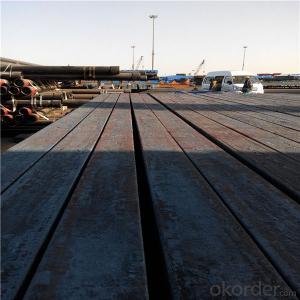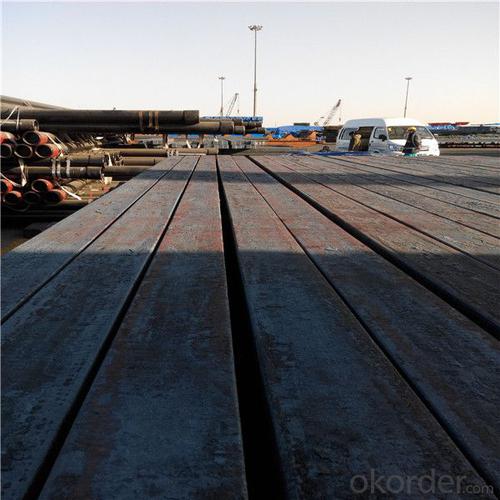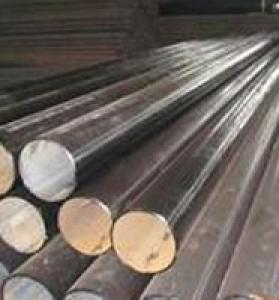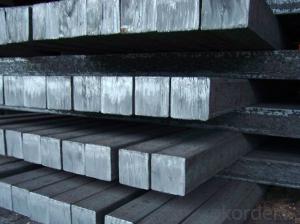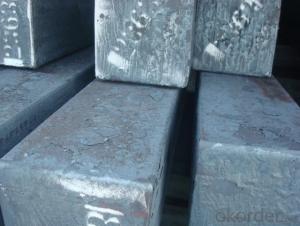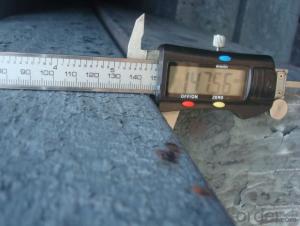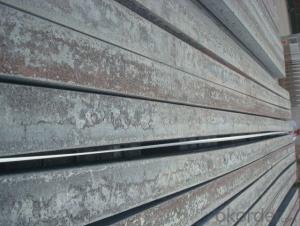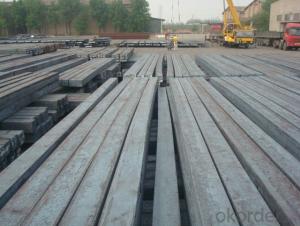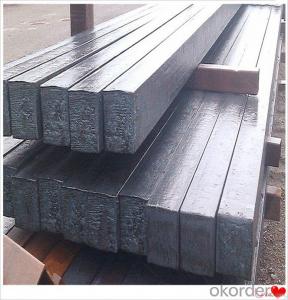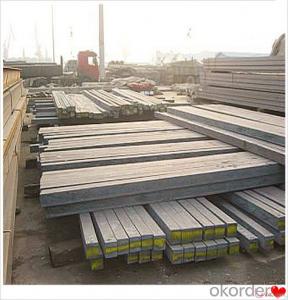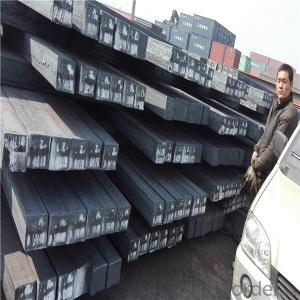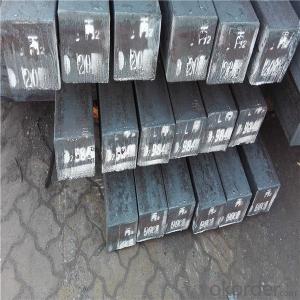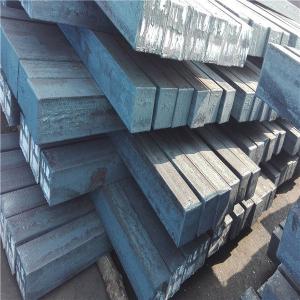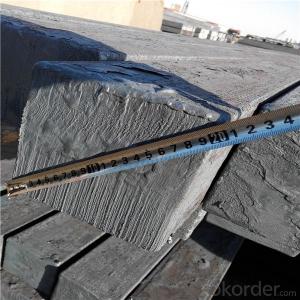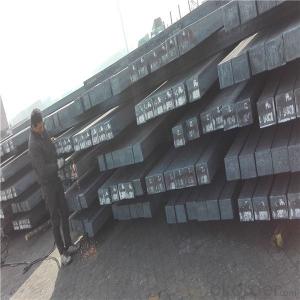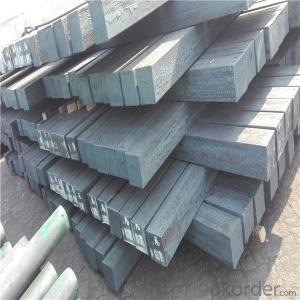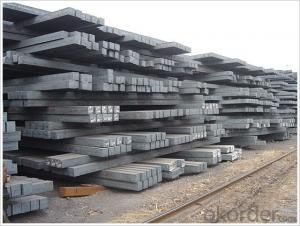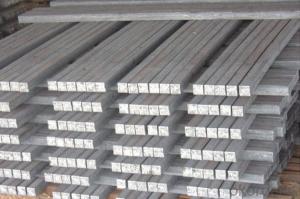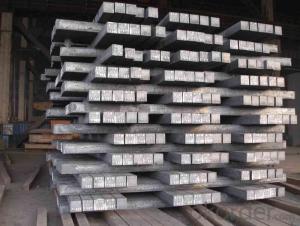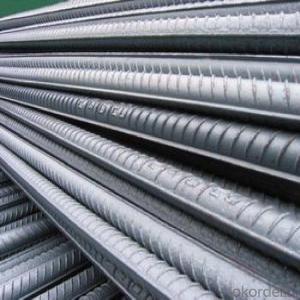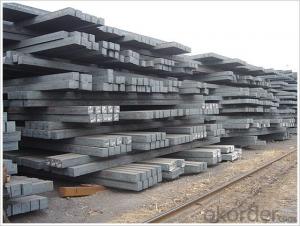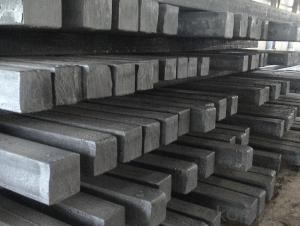Steel billet from China for sale in good quality
- Loading Port:
- Tianjin
- Payment Terms:
- TT OR LC
- Min Order Qty:
- 1000 m.t.
- Supply Capability:
- 16542 m.t./month
OKorder Service Pledge
OKorder Financial Service
You Might Also Like
Specification
Billets, or ingots (as they sometimes referred to), are not of practical use until they have been formed
into more functional shapes and sizes. While they have already been put in the furnace, they still require
a series of shaping and molding procedures such as hot and cold working, milling and cutting before they
are sold in hardware stores, or used for different applications. The unformed billets, however, can be used
in striking currency such as coins and as reserves, similar to gold bars.
Gade:
Standard | C(%) | Mn(%) | S(%) | P(%) | Si(%) |
Q195 | ≤0.12 | ≤0.50 | ≤0.040 | ≤0.035 | ≤0.30 |
Q235 | ≤0.20 | ≤1.40 | ≤0.045 | ≤0.045 | ≤0.35 |
Q275 | ≤0.22 | ≤1.50 | ≤0.045 | ≤0.045 | ≤0.35 |
20MnSi | 0.17-0.25 | 1.2-1.6 | ≤ 0.050 | ≤ 0.050 | 0.40-0.80 |
3SP | 0.14-0.22 | 0.40-0.85 | ≤ 0.050 | ≤ 0.040 | 0.05-0.15 |
5SP | 0.28-0.37 | 0.50-1.00 | ≤ 0.050 | ≤ 0.040 | 0.15-0.30 |
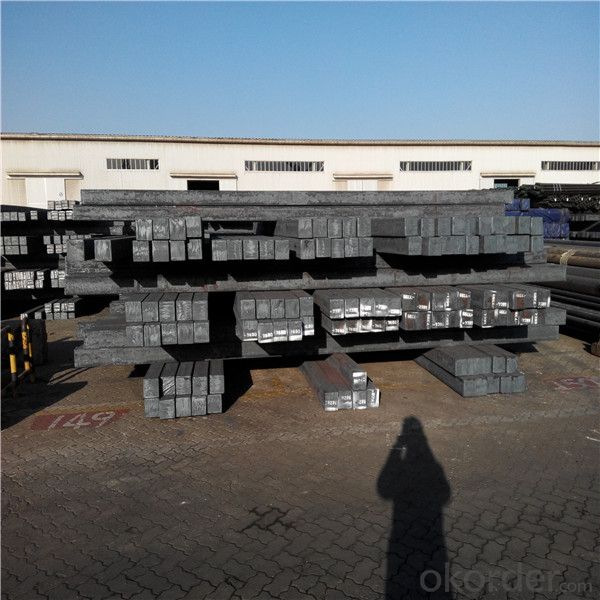
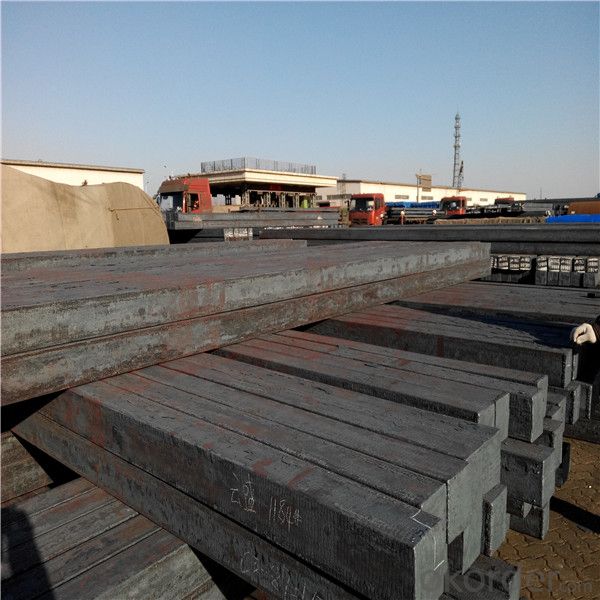
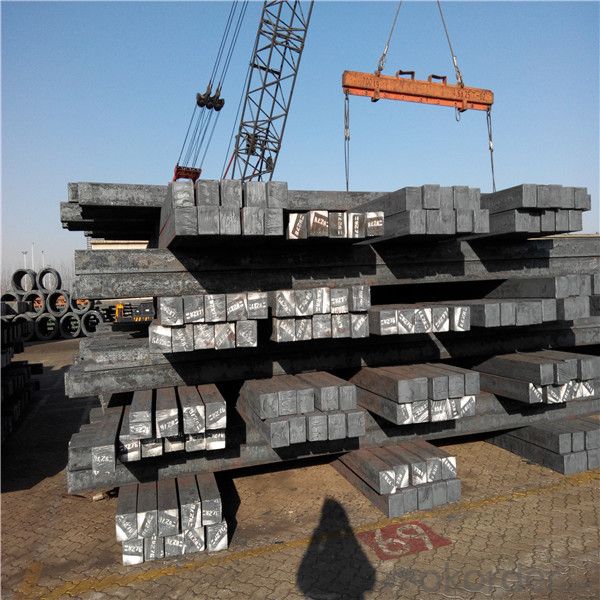
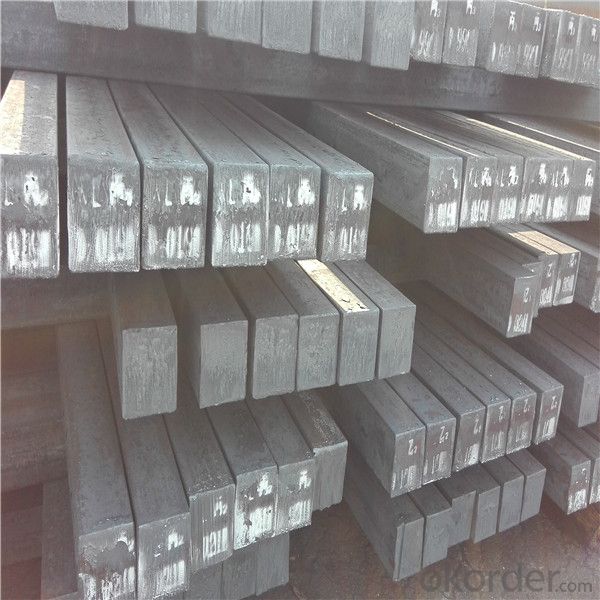
Other Specifications
Squar Tolerance: ±4
Length Tolerance: +100mm
Romboidity/Difference Diagonals: no more than 0.7%
Camber: no more than 1.5%(%)
Twist: no more than 3 degrees per 1 meter length
Our Advantage
* Professional Personnel of Steel Trading
* Strong Steel Industry Background
* Conveniently Geographic Location
Our Commitment
* Sincere, Practical, Efficient and Developing
* High Quality Steel Production
* Competitive Price and Timely Delivery
Packing :
Within 30 days
1.Standard export package
2.In bundles with steel strips
3.As the requirements of the customers
FAQ:
Q: How to get quotation?
A: When we receive your detailed enquiry, we will set the best price based on standard,
steel grade, outer diameter, wall thickness, quantity, country.
And we will send quotation to your mailbox.
Q:How to guarantee the quality of the products?
A:We have established the international advanced quality management system,every link from raw material
to final product we have strict quality test;We resolutely put an end to unqualified products flowing into the market.
At the same time, we will provide necessary follow-up service assurance.
Q:How long can we receive the product after purchase?
A :In the purchase of product within three working days, We will arrange the factory delivery as soon as possible.
The pecific time of receiving is related to the state and position of customers.
- Q: How do steel billets contribute to the food processing industry?
- Steel billets contribute to the food processing industry in several ways. Firstly, steel billets are used to manufacture various machinery and equipment used in the food processing industry. For example, they are used to create conveyor belts, mixers, crushers, and packaging machines, among others. These machines play a crucial role in the processing, handling, and packaging of food products. Steel billets are also used to produce storage tanks and containers, which are essential for the safe and hygienic storage of food ingredients and finished products. These tanks are usually made of stainless steel, which is corrosion-resistant, durable, and easy to clean, ensuring that the food remains uncontaminated and of high quality. Furthermore, steel billets contribute to the construction of infrastructure in the food processing industry. They are used to build food processing plants, warehouses, and cold storage facilities. These structures provide the necessary environment for food processing, such as temperature control and proper ventilation, ensuring food safety and preservation. Additionally, steel billets are crucial for the transportation of food products. They are used to manufacture shipping containers, refrigerated trucks, and railway cars, which enable the efficient and safe transportation of food from one location to another. The strength and durability of steel ensure that the food products are protected during transit, preventing spoilage and contamination. Overall, steel billets are essential in the food processing industry as they contribute to the manufacturing of machinery, storage containers, infrastructure, and transportation systems. Their properties of strength, durability, and corrosion resistance make them ideal for ensuring food safety, quality, and efficiency in all stages of food processing.
- Q: What is the typical weight of a steel billet?
- The weight of a steel billet can differ based on its size and purpose, resulting in a range of common weights between 1,000 and 5,000 pounds (450 to 2,270 kilograms). This weight range grants flexibility in manufacturing processes and enables diverse applications across industries like construction, automotive, and manufacturing. It is crucial to acknowledge that distinct weight prerequisites might vary according to the steel billet's intended use and specifications.
- Q: What are the main factors that influence the strength of steel billets?
- The main factors that influence the strength of steel billets are the chemical composition, heat treatment, and microstructure of the steel. The chemical composition of steel billets plays a significant role in determining their strength. The presence of alloying elements such as carbon, manganese, silicon, and chromium can enhance the strength of steel by forming solid solutions or precipitates that increase the hardness and tensile strength of the material. Additionally, controlling the impurity levels and ensuring the desired balance of alloying elements is crucial in achieving the desired strength properties. Heat treatment is another crucial factor that influences the strength of steel billets. The heat treatment process involves heating the steel to a specific temperature, followed by cooling at a controlled rate. This process can significantly affect the microstructure of the steel, which in turn impacts its strength. For instance, quenching and tempering can result in the formation of a desired microstructure, such as martensite or bainite, which enhances the strength and toughness of the steel. The microstructure of steel billets is a key factor in determining their strength. The arrangement of the crystal grains and the presence of various phases within the steel can greatly influence its mechanical properties. Fine-grained structures generally exhibit higher strength due to a greater number of grain boundaries, which inhibit dislocation movement and enhance strength. Additionally, the presence of specific microstructural features, such as precipitates or second-phase particles, can also contribute to the strength of steel billets. Furthermore, factors such as the manufacturing process, cooling rate during solidification, and mechanical working (such as rolling or extrusion) can affect the strength of steel billets. These factors influence the grain size, grain boundary density, and defect concentration, all of which impact the mechanical properties of the steel. In summary, the strength of steel billets is influenced by the chemical composition, heat treatment, and microstructure of the steel. These factors can be carefully controlled and optimized to achieve the desired strength properties for various applications.
- Q: How do steel billets affect the overall cost of a project?
- Steel billets can significantly impact the overall cost of a project as they serve as the raw material for various steel products. The price and availability of steel billets directly influence the cost of manufacturing steel components, structures, or equipment. Fluctuations in billet prices can affect supply chain costs, transportation expenses, and ultimately impact the total project cost. Additionally, the quality and specifications of steel billets can also affect the efficiency, durability, and performance of the final product, further influencing the overall project cost.
- Q: How are steel billets coated or painted?
- Steel billets can be coated or painted through several methods. One common technique is hot-dip galvanizing, where the billets are immersed in a bath of molten zinc. This process forms a protective zinc coating on the surface of the steel, preventing corrosion. Another method is electroplating, which involves the deposition of a thin layer of metal, such as zinc or nickel, onto the billets using an electric current. Additionally, steel billets can be painted using various coating systems, such as powder coating or liquid paint, to provide a decorative finish or additional protection against rust and environmental factors.
- Q: What is the role of steel billets in the construction of airports and terminals?
- Steel billets play a crucial role in the construction of airports and terminals as they serve as the raw material for manufacturing various structural components. These billets are used to create beams, columns, and other load-bearing elements, providing the necessary strength and durability to support the heavy infrastructure of airports and terminals. Additionally, steel billets are also utilized in the construction of runways, hangars, and other facilities, ensuring the safety and stability of these vital structures.
- Q: What is the role of steel billets in the manufacturing of tools and dies?
- Steel billets are essential for the production of tools and dies, playing a crucial role in the manufacturing process. These semi-finished steel products serve as the starting material, being heated, forged, and shaped to create the desired tools and dies used in different industries. The use of steel billets offers several advantages, primarily due to their high strength and durability. Steel is known for its excellent mechanical properties, such as hardness, toughness, and wear resistance. When manufacturers use high-quality steel billets, they can be confident that the resulting tools and dies will have the necessary strength and durability to withstand demanding conditions. In addition, steel billets provide versatility in terms of customization. They can be easily shaped and formed into various sizes and dimensions, allowing manufacturers to create tools and dies that meet specific requirements. Whether it's a complex mold or a precision cutting tool, steel billets offer the flexibility needed to produce intricate and accurate components. Moreover, steel billets are preferred in the manufacturing of tools and dies due to their thermal conductivity. Steel effectively conducts heat, which is crucial for processes like heat treatment, quenching, and tempering. These thermal treatments are often used to enhance the hardness and strength of tools and dies, making them more resistant to wear and extending their lifespan. In conclusion, steel billets are indispensable in the manufacturing of tools and dies. They serve as the primary material for these components, providing high strength, durability, customization options, and thermal conductivity. By utilizing steel billets, manufacturers can create tools and dies that meet the demanding requirements of various industries, ensuring optimal performance and longevity.
- Q: What are the main factors affecting the thermal expansion of steel billets?
- The main factors affecting the thermal expansion of steel billets include temperature, composition of the steel, and the grain structure of the material.
- Q: What is the role of steel billets in the production of valves and fittings?
- Valves and fittings, which are crucial in industries like oil and gas, petrochemical, and water treatment, rely heavily on steel billets. These billets, derived from molten steel, serve as the starting point for producing these components. To meet specific requirements, the billets are cast into shapes like round, square, or rectangular. The usage of steel billets enables manufacturers to maintain consistent quality and performance in valves and fittings. The selection process involves considering factors such as chemical composition, mechanical properties, and microstructure to guarantee the desired characteristics in the end product. After obtaining the steel billets, they undergo various manufacturing processes like forging, machining, and heat treatment. These processes further enhance the strength, integrity, and functionality of the final valve and fitting components. One of the advantages of steel billets is their versatility in customization. They can be easily cut, shaped, and formed to create valves and fittings with different sizes, configurations, and designs. This flexibility allows them to meet the specific requirements of different applications and industries. In summary, steel billets serve as the raw material for valves and fittings, playing a vital role in their production. Their strength, durability, and customization capabilities ensure the reliability and performance of these components in various industrial settings.
- Q: What is the difference between steel billets and steel bars?
- Steel billets and steel bars are both raw forms of steel, but they differ in terms of their shapes and sizes. Steel billets are larger, rectangular-shaped semi-finished products that are typically used as input material for further processing, such as rolling or forging. On the other hand, steel bars are smaller, cylindrical-shaped finished products that have undergone additional processing, such as hot or cold rolling, to achieve a desired shape and size. In summary, steel billets are the starting point in the steel production process, while steel bars are the end products ready for use in various applications.
Send your message to us
Steel billet from China for sale in good quality
- Loading Port:
- Tianjin
- Payment Terms:
- TT OR LC
- Min Order Qty:
- 1000 m.t.
- Supply Capability:
- 16542 m.t./month
OKorder Service Pledge
OKorder Financial Service
Similar products
Hot products
Hot Searches
Related keywords
